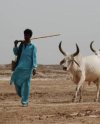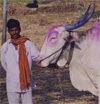International collaboration among herders

“The world’s 120 million pastoralists have much in common”, says LPP’s Evelyn Mathias. “They face common problems and should work together to solve them.”
Evelyn gave a presentation at a symposium on the European Sheep Trek in Brussels on 14 September 2010.
Most herders live in areas unsuited for cropping, such as dry areas and mountains. They rely heavily on their animals and on the environment. Many are mobile for at least part of the year. They are exceptional breeders, and maintain many unique local breeds. They are important in conserving the environment and producing food – but their role is often not appreciated by governments.
Such features are common not only in the developing world, but also among herders in Europe and other developed countries.
Groups of herders already collaborate internationally – for example through the LIFE Network. But herders should increase their collaboration to achieve recognition, supportive policies and appropriate opportunities in the future.
Download presentation (in German)
Livestock Keepers’ Rights
Livestock Keepers’ Rights are a concept developed by civil society through a series of grassroots consultations with indigenous livestock keeping communities during the “Interlaken process” during the “Interlaken process” that led to the Global Plan of Action on Animal Genetic Resources. Initially only advocated for by a group of non-government organizations, livestock keepers, pastoralist associations and scientists who support community-based conservation of local breeds, while governments resisted. But as a consequence of the recently concluded Nagoya Protocol on Access and Benefit-Sharing, there is now increased interest even among governments in addressing Livestock Keepers’ Rights.
Current Project
Lobbying and Capacity-building for the Implementation of International Legal Frameworks Relating to Biodiversity Conserving Livestock Keepers
Publications
- Livestock Keepers’ Rights: The State of Discussion. Animal Genetic Resources: 47, 1–5. 2010.
Call for in-situ conservation of livestock breeds

A group of non-government organizations has called on governments and international organizations to support the conservation of livestock breeds in their original habitats – and by the livestock-keeping groups that developed them.
Members of the LIFE Network, a grouping of organizations focusing on local livestock breeds, made the call at a conference at Kuttapalayam, in Tamil Nadu, India, on 13-15 August 2010.
The final statement from the conference calls on the Food and Agriculture Organization of the United Nations to promote agro-ecosystems approaches to the management of animal genetic resources and support indigenous and local production systems.These goals are already incorporated in the Global Plan of Action on Animal Genetic Resources.
The NGOs also demanded that livestock keepers be included in the debate about the future of livestock production and to be recognized as guardians of livestock biodiversity.
The conference statement was signed by 21 NGOs from India, South Africa, Kenya, Spain and Germany.
Blog posting from Natural Justice, a South African NGO that participated in the conference.
Download the Kuttapalayam Confirmation document 123 kb
- Go to the previous page
- 1
- …
- 43
- 44
- 45
- 46
- 47
- 48
- 49
- …
- 86
- Go to the next page
